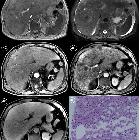hepatic veno-occlusive disease









Sinusoidal obstruction syndrome (SOS), previously known as hepatic veno-occlusive disease (VOD), is a condition arising from occlusion of hepatic venules.
Clinical presentation
- right upper quadrant pain
- painful hepatomegaly
- ascites
- abnormal liver function tests
Pathology
Toxic injury to liver sinusoids causes sloughing of endothelial cells that embolize to hepatic venules and cause eventual fibrosis of the venules. This results in hepatic congestion (similar to Budd-Chiari syndrome) and post-sinusoidal portal hypertension.
Etiology
- bone marrow transplantation
- chemotherapy, includes systemic neo-adjuvant chemotherapy in metastatic colorectal cancer, particularly the use of oxaliplatin
- pyrrolizidine alkaloids (Jamaican bush tea)
Radiographic features
Ultrasound
The imaging modality of choice, which may show:
- hepatomegaly
- portal vein abnormalities:
- portal vein dilatation
- portal venous pulsatility
- hepatofugal portal venous flow
- elevated hepatic artery resistive index (> 0.8)
- loss of triphasic hepatic venous flow
- gallbladder wall thickening (> 6-8 mm)
- ascites
CT
- hepatomegaly
- nutmeg liver
- portal vein dilatation
- ascites
MRI
Recent MRI studies with hepatocyte-specific contrast agent show a diffuse hypointense reticular pattern on post-contrast T1 delayed hepatobiliary phase as a highly specific sign for the diagnosis.
Treatment and prognosis
There is no standard treatment regimen but options include:
- anticoagulation
- vasodilators
- supportive care
Preoperative planning for hepatic metastasectomy should include exclusion of SOS after the use of chemotherapy as there is an increased risk of postoperative liver failure.
Approximately half resolve but high mortality in severe cases (up to 90%).
Complications
- hepatic failure
- portal hypertension
- death
Siehe auch:
- portale Hypertension
- Aszites
- Hepatomegalie
- Budd-Chiari-Syndrom
- Venenverschlusskrankheit der Lunge
- Muskatnussleber
- bone marrow transplantation
- Actinomycin D
- hepatic veno-occlusive disease with immunodeficiency
und weiter:

 Assoziationen und Differentialdiagnosen zu Venenverschlusskrankheit der Leber:
Assoziationen und Differentialdiagnosen zu Venenverschlusskrankheit der Leber:





